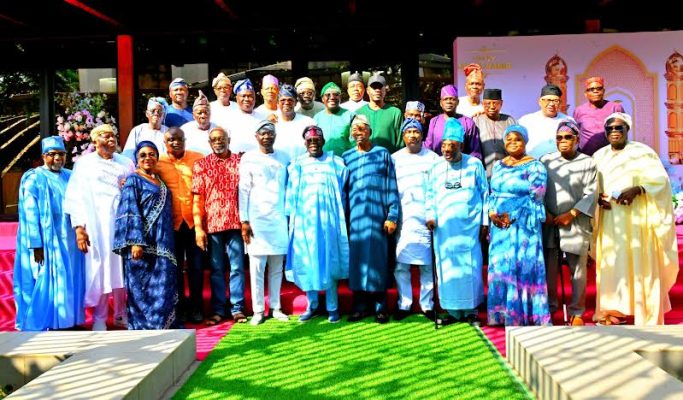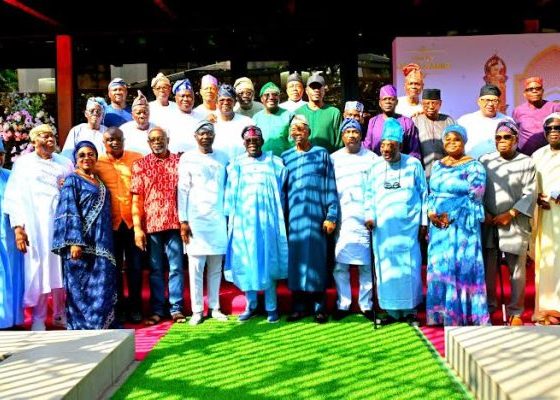

Politics
Tinubu and Sanwo-Olu Reconcile in GAC-led Peace Deal as Lagos Politics Finds Calm
The political tension between President Bola Ahmed Tinubu and Lagos State Governor Babajide Sanwo-Olu appears to have eased following a reconciliation brokered by the Lagos Governance Advisory Council (GAC). The meeting, which took place at Tinubu’s Ikoyi residence, put to rest growing speculations of a rift between the two leaders.
Governor Sanwo-Olu, accompanied by top GAC members and led by GAC Chairman Prince Tajudeen Olusi, reportedly sought Tinubu’s forgiveness amid concerns of a widening political gap. Sources present at the closed-door meeting confirmed that Tinubu declared the matter resolved, stating, “All is over. There is no need to beat around the bush… continue with your work.”
This public show of reconciliation follows weeks of speculation fuelled by Sanwo-Olu’s absence at key public events attended by Tinubu, including a widely circulated moment where the President seemed to deliberately avoid shaking the governor’s hand.
Inside sources revealed that the peace meeting was the result of sustained back-channel diplomacy by influential GAC members worried about the potential fallout ahead of the 2027 elections. One GAC member reportedly appealed to Tinubu, saying, “We know you are not pleased with some of us, especially the governor. We ask for mercy.”
Tinubu’s response: “It’s all over now. All is forgiven.”
The President also gave the green light for the state’s scheduled local government elections on July 12, instructing the party leadership to ensure transparency and fairness, adding, “I am too busy for council matters.”
Sanwo-Olu and his delegation, in a show of deference, were said to have prostrated before the President in a traditional Yoruba gesture of submission and reconciliation.
Following the meeting, Sanwo-Olu downplayed the conflict in a media chat, saying, “There’s no discord. He’s my father, my leader.” He described the visit as a regular Sallah homage and insisted that recent rumours were overblown: “People are crying more than the bereaved.”
The governor also reaffirmed support for Tinubu’s economic reforms, noting signs of progress and urging Nigerians to give the administration more time.
Lagos PDP Faces Exodus as Sowunmi Meets Tinubu
In a related political twist, former PDP spokesperson and Atiku Abubakar ally, Segun Sowunmi, visited President Tinubu during the Sallah festivities. The meeting has stirred talk of Sowunmi’s possible defection to the APC, further signalling fractures within the PDP.
This comes as multiple high-profile PDP figures in Lagos—including a former deputy governorship candidate and several 2023 election aspirants—prepare to join the APC. A formal announcement is expected at the Lagos4Lagos Movement secretariat in Ikeja.
The movement’s leader, Dr. Olajide Adediran (Jandor), who himself defected to the APC earlier this year, has repeatedly cited a lack of discipline within the PDP as his reason for jumping ship.
Udom Emmanuel Keeps Silent on Successor’s APC Move
Meanwhile, in Akwa Ibom, former Governor Udom Emmanuel has chosen not to comment on the recent defection of his successor, Governor Umo Eno, to the APC. Emmanuel, who played a key role in Eno’s emergence as governor, has maintained a stance of political neutrality since leaving office in 2023.
In a statement issued by his aide, Emmanuel affirmed that he has fully withdrawn from public political discourse, respecting Eno’s independence in governance. The former governor’s camp also warned against false reports, demanding verifiable evidence from anyone claiming he had spoken on the matter.
Analysis
With this truce, Lagos APC appears to have narrowly avoided a major internal shake-up, at least for now. But the events reflect deeper undercurrents of tension in Nigeria’s most politically influential state. As Tinubu consolidates his presidency, loyalty from his political base is non-negotiable—and visible dissent, even subtle, has its costs.
The exodus from the PDP further complicates the opposition’s future in Lagos, while defections in other states suggest a broader shift in Nigeria’s political map as 2027 draws nearer.





